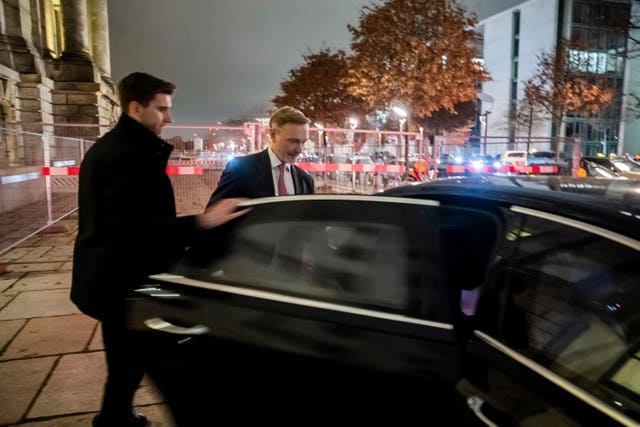Germany’s governing coalition collapses after Scholz fires key minister
The chancellor’s left-leaning Social Democrats will now effectively lead a minority government with its remaining coalition partner.

Germany’s governing coalition has collapsed after Chancellor Olaf Scholz dramatically fired finance minister Christian Lindner in a late-night move after a marathon of crisis meetings.
The three remaining ministers of the Free Democrats also resigned soon afterwards, effectively leading to the government coalition’s collapse.
Mr Lindner will receive his certificate of dismissal from President Frank-Walter Steinmeier on Thursday afternoon and, to ensure a smooth transition, a successor will likely be named right after.

Dpa also reported that Jorg Kukies, an economic adviser to Scholz, will become the next finance minister.
Mr Scholz announced late on Wednesday that he would seek a vote of confidence on January 15 that he said might lead to an early election as soon as March — which otherwise would have been be due next September.
He had accused Mr Lindner of breaching his trust and publicly calling for a fundamentally different economic policy, including what the chancellor said would be tax cuts worth billions for a few top earners while at the same time cutting pensions for all retirees.
“That is not decent,” Mr Scholz said.
Mr Scholz’s left-leaning Social Democrats will now effectively lead a minority government with the remaining coalition partner, the environmentalist Greens.
The chancellor announced late on Wednesday that he would reach out to the leader of the biggest opposition leader in parliament, Friedrich Merz from the centre-right Christian Democrats, to confer on possible ways of strengthening the economy and defence, and passing important legislation through parliament.

Mr Lindner’s pro-business Free Democrats had rejected tax increases or changes to Germany’s strict self-imposed limits on running up debt.
Mr Scholz’s Social Democrats and the Greens wanted to see major state investment and rejected the Free Democrats’ proposals to cut welfare programmes.
However, pushing through new legislation and plugging the billion-euro hole in the 2025 budget will not become easier for Mr Scholz’s Social Democrats and the Greens as their government no longer has a majority in parliament.
The governor of the German state of Bavaria, Markus Soder, a leading figure in Germany’s centre-right opposition, said that an early election should be held earlier than March.
“No more time can be lost now,” Mr Soder wrote on X, formerly Twitter, as he called for a new vote and government quickly. “There must be no tactical delays.”





